- Home
- Dave Pelzer
A Child Called It Page 2
A Child Called It Read online
Page 2
“Yes, sir. I’ll try,” is all I can say.
The school nurse stands in silence beside Mr. Hansen. They all tell me goodbye. Now I know I am going to jail. “Good,” I tell myself. “At least she won’t be able to beat me if I’m in jail.”
The police officer and I walk outside, past the cafeteria. I can see some of the kids from my class playing dodge ball. A few of them stop playing. They yell, “David’s busted! David’s busted!” The policeman touches my shoulder, telling me everything is okay. As he drives me up the street, away from Thomas Edison Elementary School, I see some kids who seem to be fazed by my departure. Before I left, Mr. Ziegler told me he would tell the other kids the truth—the real truth. I would give anything to have been there in class when they found out I’m not so bad.
In a few minutes, we arrive at the Daly City Police Station. I sort of expect Mother to be there. I don’t want to get out of the car. The officer opens the door and gently takes me by the elbow, into a big office. No other person is in the room. The policeman sits in a chair, in the corner, where he types several sheets of paper. I watch the officer closely as I slowly eat my cookies. I savor them as long as I can. I don’t know when I will be eating again.
It’s past 1:00 P.M. when the policeman finishes his paperwork. He asks for my telephone number again.
“Why?” I whine.
“I have to call her, David,” he says gently.
“No!” I command. “Send me back to school. Don’t you get it? She mustn’t find out I told!”
He calms me down with another cookie, as he slowly dials 7-5-6-2-4-6-0. I watch the black dial turn as I get up and walk towards him, straining my whole body while trying to hear the phone ringing on the other end. Mother answers. Her voice scares me. The policeman waves me away, and takes a deep breath before saying, “Mrs. Pelzer, this is Officer Smith from the Daly City Police Department. Your son David will not be coming home today. He will be in the custody of the San Mateo Juvenile Department. If you have any questions, you can call them.” He hangs up the phone and smiles. “Now that wasn’t so hard, was it?” he asks me. But the look on his face tells me he is assuring himself, more than he is me.
A few miles later, we are on highway 280, heading towards the outskirts of Daly City. I look to my right and see a sign that reads, “THE MOST BEAUTIFUL HIGHWAY IN THE WORLD.” The officer smiles with relief, as we leave the city limits. “David Pelzer,” he says, “you’re free.”
“What?” I ask, clutching my only source of food. “I don’t understand. Aren’t you taking me to some kind of jail?”
Again he smiles, and gently squeezes my shoulder. “No, David. You have nothing to worry about, honest. Your mother is never going to hurt you again.”
I lean back against the seat. A reflection from the sun hits my eyes. I turn away from the rays as a single tear runs down my cheek.
“I’m free?”
CHAPTER
2
Good
Times
In the years before I was abused, my family was the “Brady Bunch” of the 1960s. My two brothers and I were blessed with the perfect parents. Our every whim was fulfilled with love and care.
We lived in a modest two-bedroom house, in what was considered a “good” neighborhood in Daly City. I can remember looking out of our living room bay window on a clear day, to gaze at the bright orange towers of the Golden Gate Bridge and the beautiful skyline of San Francisco.
My father, Stephen Joseph, supported his family as a fireman, working in the heart of San Francisco. He stood about five feet ten inches tall, and he weighed about 190 pounds. He had broad shoulders and forearms that would make any muscle man proud. His thick black eyebrows matched his hair. I felt special when he winked at me and called me “Tiger.”
My mother, Catherine Roerva, was a woman of average size and appearance. I never could remember the color of her hair or eyes, but Mom was a woman who glowed with love for her children. Her greatest asset was her determination. Mom always had ideas, and she always took command of all family matters. Once, when I was four or five years old, Mom said she was sick, and I remember feeling that she did not seem to be herself at all. It was a day when Father was working at the fire station. After serving dinner, Mom rushed from the table and began painting the steps that led to the garage. She coughed as she frantically brushed the red paint onto every step. The paint had not fully dried, when Mom began tacking rubber mats to the steps. The red paint was all over the mats and Mom. When she finished, Mom went into the house and collapsed on the couch. I remember asking her why she had put the mats down before the paint dried. She smiled and said, “I just wanted to surprise your dad.”
When it came to housekeeping, Mom was an absolute clean fiend. After feeding my two brothers, Ronald and Stan, and me breakfast, she would dust, disinfect, scour and vacuum everything. No room in our house was left untouched. As we grew older, Mom made sure we did our part by keeping our rooms neat. Outside, she would meticulously tend a small flower garden, which was the envy of the neighborhood. With Mom, everything she touched turned to gold. She didn’t believe in doing anything halfway. Mom often told us that we must always do the best we could, in whatever we did.
Mom was truly a gifted cook. Of all the things she did for her family, I think creating new and exotic meals was her favorite. This was especially true on those days when Father was home. Mom would spend the better part of the day preparing one of her fantastic meals. On some days when Father was working, Mom would take us on exciting sight-seeing tours around the city. One day, she took us to Chinatown in San Francisco. As we drove around the area, Mom told us about the culture and history of the Chinese people. When we returned, Mom started her record player, and our home was filled with beautiful sounds from the Orient. She then decorated the dining room with Chinese lanterns. That evening, she dressed in a kimono and served what seemed to us as a very exotic but delicious meal. At the end of dinner, Mom gave us fortune cookies and read the captions for us. I felt that the cookie’s message would lead me to my destiny. Some years later, when I was old enough to read, I found one of my old fortunes. It said, “Love and honor thy mother, for she is the fruit that gives thou life.”
Back then our house was full of pets—cats, dogs, aquariums filled with exotic fish and a gopher tortoise named “Thor.” I remember the tortoise best because Mom let me pick a name for it. I felt proud because my brothers had been chosen to name the other pets and it was now my turn. I named the reptile after my favorite cartoon character.
The five- and ten-gallon aquariums seemed to be everywhere. There were at least two in the living room, and one filled with guppies in our bedroom. Mom creatively decorated the heated tanks with colored gravel and colored foil backs; anything she thought would make the tanks more realistic. We would often sit by the tanks while Mom told us about the different species of fish.
The most dramatic of Mom’s lessons, came one Sunday afternoon. One of our cats was behaving in an odd way. Mom had us all sit down by the cat while she explained the process of birth. After all the kittens had slipped safely out of the mother cat, Mom explained in great detail the wonder of life. No matter what the family was doing, she somehow came up with a constructive lesson; though we were not usually aware that we were being taught.
For our family—during those good years—the holidays started with Halloween. One October night, when the huge harvest moon was in full view, Mom hurried the three of us out of our house, to gaze at the “Great Pumpkin” in the sky. When we returned to our bedroom, she told us to peek under our pillows where we found Matchbox race cars. My two brothers and I squealed with delight as Mom’s face was flushed with pride.
The day after Thanksgiving, Mom would disappear to the basement, then bring up enormous boxes filled with Christmas decorations. While standing on a ladder, she tacked strings of ornaments to the ceiling beams. When she was finished, every room in our house had a seasonal touch. In the dining room Mom arranged diffe
rent sizes of red candles on the counter of her prized oak hutch. Snowflake patterns graced every window in the living room and dining room. Christmas lights were draped around our bedroom windows. Every night I fell asleep while staring at the soft, colorful glow of the Christmas lights that blinked on and off.
Our Christmas tree was never even an inch under eight feet, and it took the whole family hours to decorate it. Each year one of us was honored by being allowed to place the angel at the top of the tree, while Father held us up in his strong arms. After the tree was decorated and dinner was finished, we would pile into the station wagon and cruise the neighborhood, admiring the decorations on other homes. Mom always rambled on about her ideas of bigger and better things for the next Christmas, even though my brothers and I knew our house was always the best. When we returned home, Mom sat us down by the fireplace to drink egg nog. While she told us stories, Bing Crosby sang “White Christmas” on the stereo. I was so excited during those holiday seasons that I couldn’t sleep. Sometimes Mom would cradle me, while I fell asleep listening to the crackle of the fire.
As Christmas Day came nearer, my brothers and I became more and more excited. The pile of gifts at the base of the tree grew day by day. By the time Christmas finally arrived, there were dozens of gifts for each of us.
On Christmas Eve, after a special dinner and caroling, we were allowed to open one gift. Afterwards, we were sent to bed. I always strained my ears as I laid in bed, waiting for the sound of Santa’s sleigh bells. But I always fell asleep before I heard his reindeer land on the roof.
Before dawn, Mom would creep into our room and wake us, whispering, “Santa came!” One year she gave each of us a yellow, plastic, Tonka hard hat and had us march into the living room. It took us forever to rip the colorful paper from the boxes, to discover our new Christmas toys. Afterwards, Mom had us run to the backyard in our new robes, to look back in through the window at our huge Christmas tree. That year, standing in the yard, I remember seeing Mom cry. I asked her why she was sad. Mom told me she was crying because she was so happy to have a real family.
Because Father’s job often required him to work 24-hour shifts, Mother often took us on day trips to places like the nearby Golden Gate Park in San Francisco. As we slowly drove through the park, Mom explained how the areas were different and how she envied the beautiful flowers. We always visited the park’s Steinhart Aquarium last. My brothers and I would blaze up the stairs and charge through the heavy doors. We were thrilled as we leaned over the brass, sea-horse-shaped fence, looking far below at the small waterfall and pond that were home to the alligators and large turtles. As a child, this was my favorite place in the entire park. I once became frightened, as I thought about slipping through the barrier and falling into the pond. Without speaking a word, Mom must have felt my fear. She looked down at me and held my hand ever so softly.
Spring meant picnics. Mom would prepare a feast of fried chicken, salads, sandwiches and lots of desserts the night before. Early the next day, our family sped off to Junipero Serra Park. Once there, my brothers and I would run wild on the grass and pump higher and higher on the park’s swings. Sometimes we would venture off on a new trail. Mom always had to pry us away from our fun, when it came time for lunch. We wolfed down our food, hardly tasting it, before my brothers and I blitzed off for parts unknown, in search of high adventure. Our parents seemed happy to lie next to each other on a blanket, sip red wine and watch us play.
It was always a thrill when the family went on summer vacation. Mom was always the mastermind behind these trips. She planned every detail, and swelled with pride as the activities came together. Usually we traveled to Portola or Memorial Park, and camped out in our giant, green tent for a week or so. But whenever Father drove us north across the Golden Gate Bridge, I knew we were going to my favorite place in the world—the Russian River.
The most memorable trip to the river for me, happened the year I was in kindergarten. On the last day of school, Mom asked that I be excused a half-hour early. As Father honked the horn, I rocketed up the small hill from the school, to the waiting car. I was excited because I knew where we were going. During the drive, I became fascinated at the seemingly endless fields of grapes. When we drove into the quiet town of Guerneville, I rolled my window down to smell the sweet air from the redwood trees.
Each day was a new adventure. My brothers and I either spent the day climbing an old, burnt tree stump with our special whomper-stomper boots or swimming in the river at Johnson’s Beach. Johnson’s Beach was a whole day’s event. We would leave our cabin by nine and return after three. Mom taught each of us to swim in a small, trenched hole in the river. That summer Mom taught me how to swim on my back. She seemed so proud when I was finally able to do it.
Everyday seemed sprinkled with magic. One day after dinner, Mom and Dad took the three of us to watch the sunset. All of us held hands, as we crept past Mr. Parker’s cabin to get to the river. The green river water was as smooth as glass. The bluejays scolded the other birds, and a warm breeze blew through my hair. Without a word, we stood watching the fireball-like sun as it sank behind the tall trees, leaving bright blue and orange streaks in the sky. From above, I felt someone hug my shoulders. I thought it was my father. I turned and became flushed with pride to find Mom holding me tightly. I could feel her heart beat. I never felt as safe and as warm as that moment in time, at the Russian River.
CHAPTER
3
Bad Boy
My relationship with Mom drastically changed from discipline to punishment that grew out of control. It became so bad at times, I had no strength to crawl away—even if it meant saving my life.
As a small child, I probably had a voice that carried farther than others. I also had the unfortunate luck of getting caught at mischief, even though my brothers and I were often committing the same “crime.” In the beginning, I was put in a corner of our bedroom. By this time, I had become afraid of Mom. Very afraid. I never asked her to let me come out. I would sit and wait for one of my brothers to come into our bedroom, and have him ask if David could come out now and play.
About this time, Mom’s behavior began to change radically. At times while Father was away at work, she would spend the entire day lying on the couch, dressed only in her bathrobe, watching television. Mom got up only to go to the bathroom, get another drink or heat leftover food. When she yelled at us, her voice changed from the nurturing mother to the wicked witch. Soon, the sound of Mother’s voice began to send tremors down my spine. Even when she barked at one of my brothers, I’d run to hide in our room, hoping she would soon return to the couch, her drink and her TV show. After a while, I could determine what kind of day I was going to have by the way she dressed. I would breathe a sigh of relief whenever I saw Mom come out of her room in a nice dress with her face made up. On these days she always came out with a smile.
When Mother decided that the “corner treatment” was no longer effective, I graduated to the “mirror treatment.” In the beginning, it was a no-notice form of punishment. Mother would simply grab me and smash my face against the mirror, smearing my tear-streaked face on the slick, reflective glass. Then she would order me to say over and over again, “I’m a bad boy! I’m a bad boy! I’m a bad boy!” I was then forced to stand, staring into the mirror. I would stand there with my hands locked to my sides, weaving back and forth, dreading the moment when the second set of television commercials aired. I knew Mother would soon be stomping down the hall to see if my face was still against the mirror, and to tell me what a sickening child I was. Whenever my brothers came into the room while I was at the mirror, they would look at me, shrug their shoulders and continue to play—as if I were not there. At first I was jealous, but soon I learned that they were only trying to save their own skins.
While Father was at work, Mother would often yell and scream while forcing my brothers and me to search the entire house for something she had lost. The quest usually started in the morning and laste
d for hours. After a while, I was usually sent to search in the garage which was under part of the house—like a basement. Even there, I trembled upon hearing Mother scream at one of my brothers.
The searches continued for months, and finally, I was the only one singled out to look for her things. Once, I forgot what I was looking for. When I timidly asked her what it was that I was to find, Mother smacked me in the face. She was lying on the couch at the time, and she didn’t even stop watching her television show. Blood gushed from my nose and I began to cry. Mother snatched a napkin from her table, tore a piece and rammed it up my nose. “You know damn well what you’re looking for!” she screamed. “Now go find it!” I scurried back down to the basement, making sure I made enough noise to convince Mother I was feverishly obeying her command. As Mother’s “find the thing” became more common, I began to fantasize that I had found her missing item. I imagined myself marching upstairs with my prize and Mom greeting me with hugs and kisses. My fantasy included the family living happily ever after. But, I never found any of Mother’s lost things, and she never let me forget that I was an incompetent loser.
As a small child, I realized Mom was as different as night and day when Father was home from work. When Mom fixed her hair and put on nice clothes, she seemed more relaxed. I loved it when Dad was home. It meant no beatings, mirror treatments or long searches for her missing things. Father became my protector. Whenever he went to the garage to work on a project, I followed him. If he sat in his favorite chair to read the newspaper, I parked myself at his feet. In the evenings, after the dinner dishes were cleared from the table, Father would wash them, and I would dry. I knew that as long as I stayed by his side, no harm would come to me.
One day before he left for work, I received a dreadful shock. After he said goodbye to Ron and Stan, he knelt down, held my shoulders tightly and told me to be a “good boy.” Mother stood behind him with her arms folded across her chest, and a grim smile on her face. I looked into my father’s eyes and knew right then that I was a “bad boy.” An ice-cold chill rushed through my body. I wanted to hold on to him and never let go, but before I could give Father a hug, he stood up, turned and walked out the door, without saying another word.

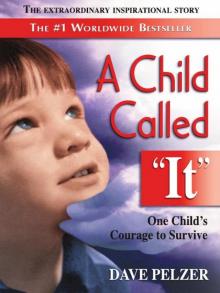 A Child Called It: One Child's Courage to Survive
A Child Called It: One Child's Courage to Survive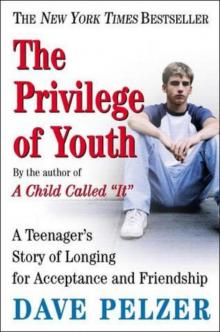 The Privilege of Youth: A Teenager's Story
The Privilege of Youth: A Teenager's Story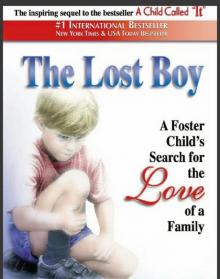 The Lost Boy: A Foster Child's Search for the Love of a Family
The Lost Boy: A Foster Child's Search for the Love of a Family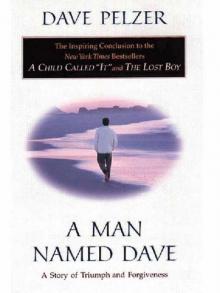 A Man Named Dave
A Man Named Dave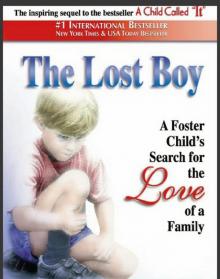 The Lost Boy
The Lost Boy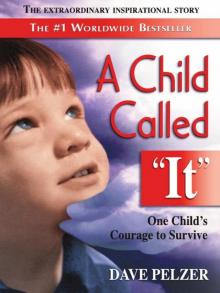 A Child Called It
A Child Called It